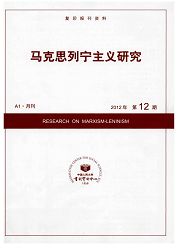

 中文摘要:
中文摘要:
20世纪初,西方世界先后形成了三种不同的马克思主义思潮:一是由伯恩斯坦、考茨基等开创的第二国际传统的思潮;二是发端于俄国、苏联而由西方一些共产党理论家所全盘接受的第三国际传统的思潮;三是卢卡奇等人最早提出后又被法兰克福学派所继承和发展的"西方马克思主义"思潮。它们之间的争论在哲学上主要围绕着两个问题展开,第一个问题是马克思主义究竟是不是哲学?第二个问题是马克思主义哲学究竟是什么?这三种思潮在哲学上的争论与分歧是紧紧地同社会理论方面的争论与分歧联系在一起的。第二国际传统的思潮为当代资本主义辩护,主张对当代资本主义实施改良的态度;第三国际传统的思潮和"西方马克思主义"思潮对当代资本主义展开批判,主张对当代资本主义实施革命的态度。后两种思潮尽管都在批判资本主义社会,但是理论出发点截然有别。共产党的理论家出发点主要是马克思的社会矛盾运动理论和剩余价值学说,而"西方马克思主义"理论家出发点则是马克思的人道主义理论和异化劳动理论。
 英文摘要:
英文摘要:
In the early years of 20th century,there were three different types of Marxist ideological waves coming into being in the West.First was the second international traditional ideological wave created by Bernstein and Kautsky;second was the third international traditional ideological wave which was originated in The Soviet Union and Russia and was totally accepted by the Communist theorists in the West,and the third was the western Marxism put forward first by Lukacs,and finally inherited and developed by the Frankfurt Group.Their conflictions on philosophy were about the following two questions: first is whether Marxism is philosophy exactly or not? Second refers to what is Marxist philosophy is actually about? The conflictions and differences among the three on philosophy and society theory were tightly connected.The second international traditional ideological wave pleaded for the contemporary capitalism,holding the view that capitalism be improved.Yet the third international traditional ideological wave and the Western Marxism criticized contemporary capitalism,believing that there be a revolution on it.Though both criticized capitalist society,their starting points were totally different,the starting point of the Communist Party theorists mainly depended on Marx’s social contradiction theory and the doctrine of surplus value,while the starting point of western Marxism wws Marx’s humanism theory and the labor theory of alienation.
 同期刊论文项目
同期刊论文项目
 同项目期刊论文
同项目期刊论文
 期刊信息
期刊信息
